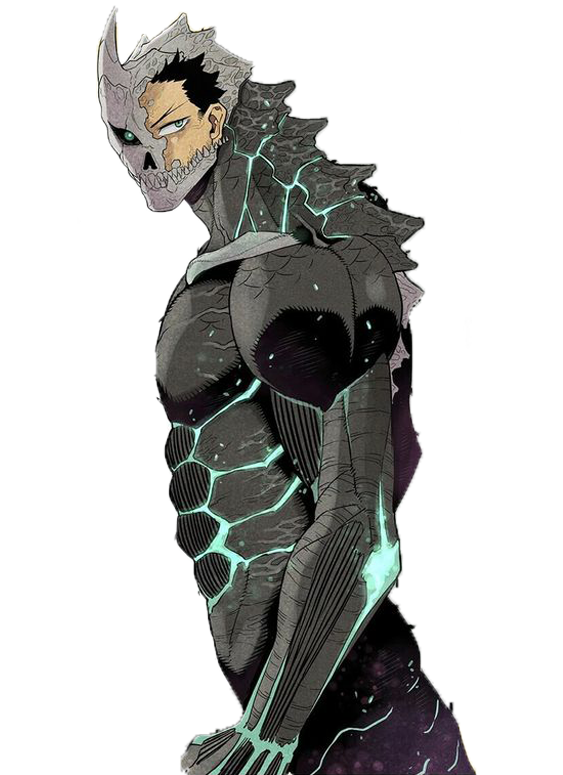When it comes to shonen manga, almost every protagonist is either a teenager or at most, a 20-something year old. However, in one shonen series, someone in their ‘30s is the main star. That manga is Naoya Matsumoto’s Kaiju No. 8 and its hero is a 32-year old man still trying to make his dreams come true.
Kafka Hibino, the protagonist, was once someone who aspired to be a member of the Defense Force to fight against kaiju. He has a childhood friend, Mina Ashiro, who had the same dream. Mina would achieve her dream by becoming a high-ranking Defense Force officer, while Kafka ended up becoming a kaiju disposal worker. One day at his job, Kafka meets a young, aspiring Defense Force member named Leno Ichikawa. The two formed a quick bond despite their age gap. Leno then tells Kafka that the age limit to be a Defense Force soldier was increased to 33. Kafka thought about chasing the dream again, but then he and Leno were attacked by a monster. Kafka saves Leno, but the monster somehow ends up inside Kafka’s body. Kafka suddenly gains the ability to become a very powerful kaiju as a result and decides to join the Defense Force with his newfound powers and catch up to Mina despite being the “enemy.”
It’s pretty cool to see this because there’s not enough middle-aged main heroes in shonen series worth highlighting. This is true in most Japanese media. Either they’re young or old. There’s no in-between. However, I will note that almost every shonen series is about chasing your dreams. Kafka is the same.
You can arguably say the important message from Kaiju No. 8 is that you’re never too old to still chase your dreams. Better late than never, right? I think of the people who have a lot of goals and dreams, only for them to stop chasing them or just be crushed by the weight of them. And then I remember something someone once said to me, “Sometimes, they were never given the opportunity to dream again or be able to chase it.” In Kafka’s case, meeting Leno and getting kaiju powers were those opportunities.
We’re all so bombarded with often mundane responsibilities that seek to limit our dream-seeking and our potential to help one another during times of great stress. We’re not built to be cogs for a world that won’t always think the best for us.
What shined for me with regards to Kaiju No. 8 is Kafka’s enthusiasm and the vulnerability that comes as a result of it. Because he is so ambitious about protecting people, Kafka has insecurities about what to do if he can’t protect anyone. There was a moment in the story where his kaiju powers were getting the best of him. While fighting a powerful kaiju, Kafka starts to become afraid of transforming out of fear of going berserk on his Defense Force comrades and hurting innocent people. One of Kafka’s fellow comrades, Kikoru Shinomiya, snaps him out of it by telling him not to think so little of those who are strong enough to handle themselves. Learn to trust others who can protect themselves.
I think the older we get, the more we tend to dislike a lot of people. It’s different in Kafka’s case, but I really like that this is a middle-aged character with a bunch of enthusiasm about helping people in need. I think Kafka is a timely character because we have a lot of anime/manga fans aging into their ‘30s and some still have that shonen mindset of wanting to make things happen.
While not giving up is always aspiring, the environment we’re placed in can sometimes make someone want to do so. That’s why I believe it’s important that institutions provide resources and opportunities to make middle-aged adults still feel like they matter. 4 years of college in your 20s’ should not be the end of learning and growing. I say this because ageism is still a huge problem in the world. There’s definitely cool people like Kafka out there, but sometimes, they just need a chance by others to prove themselves when they can’t find it themselves.
What’s interesting to me is that Kaiju No. 8 came off the heels of another property featuring a middle-aged hero in a genre that normally has young protagonists, Yakuza: Like a Dragon. The game starred a 40-year old former yakuza, Kasuga Ichiban, who falls out of luck with his triad family in Tokyo and tries to rebuild his life in Yokohama. It’s also a turn-based Japanese RPG, where middle-aged characters tend to be in the supporting roles. A lot of people (especially older adults) found this game refreshing because it’s about a group of middle-aged adults taking the stage to fight against a huge political conspiracy. The game’s sequel, Like a Dragon: Infinite Wealth, continues this trend of older JRPG protagonists that are relatable to middle-aged adults.
Much like what the Like a Dragon games did for me, Kaiju No. 8 and Kafka show that adults can still do some great things despite some limitations. Sure, the other characters in the manga are great, but Kafka being the chosen hero at the age of 32 who can save everyone is what some readers and I are looking for. Naoya Matsumoto gave a great message about the manga’s appeal in that it’s for people dealing with the complexes of reality who are trying to create a future worth having. It’s not just about chasing dreams; it’s more about having some kind of realistic optimism for life and the people who are doing their best.
No matter what age we’re at, we should be given a chance to decide what we want to better ourselves and the world.
